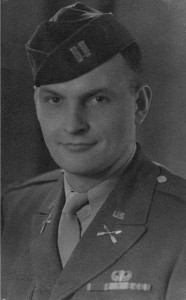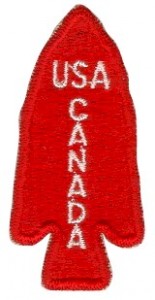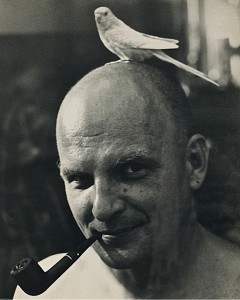 Send to Kindle
Send to Kindle I considered saving this post for Father’s Day next month, but after much thought decided this post was most apt for Memorial Day, because it was my dad’s participation in the First Special Service Force, during WWII that shaped his life more than anything else. Called the Devil’s Brigade, by the Nazi’s because of their dare-devil bravery and skills, this American-Canadian commando unit was organized in 1942. You can learn more about them here.
I considered saving this post for Father’s Day next month, but after much thought decided this post was most apt for Memorial Day, because it was my dad’s participation in the First Special Service Force, during WWII that shaped his life more than anything else. Called the Devil’s Brigade, by the Nazi’s because of their dare-devil bravery and skills, this American-Canadian commando unit was organized in 1942. You can learn more about them here.
The day after marrying my mother on February 14, 1942, Dad enlisted and was sent to Helena, Montana, where he trained as a paratrooper, learned to ski, and fight in winter conditions. On completing training in 1943, his unit was sent to Kiska, in the Aleutian Islands, where he and his comrades were to take down the Japanese forces gathering there. But finding that the Japanese had evacuated the island in anticipation of their arrival, the force was sent to Italy. Dad was dropped over Anzio, and worked his way up the boot of Italy into Southern France and eventually to Germany, where he and his men opened up the gates of German concentration camps, to set those who had survived the Holocaust free. He remained in Germany after the war, working in intelligence for the army. Mom and I joined him there in 1946 and my brother, Zed, was born in Munich, Germany, in November of 1947.
As Dad worked his way up to the rank of Major, he was part of numerous catastrophic battles and traumatic events. After his drop over Italy, he became aware that the plane scheduled to drop troops in the same spot after his, tragically dropped them into the Mediterranean, due to the same bad weather conditions my father’s plane had encountered. The entire load of soldiers drowned.
Never physically wounded himself, Dad found himself to be the last man standing, as his unit worked at taking out a nest of Nazi’s. After another battle, he saw his best buddy’s head blown off as they stood together overlooking an area they believed they’d cleared of German troops.
Dad rarely talked about his experiences or his medals for bravery, but it was evident that the war had brought about huge changes in him. Mom always said he wasn’t the man she had married when he returned home after the war.
At the time, a returning soldier’s constant mood swings and violent behaviors were blown off as Shell Shock, something he and others in his position would grow out of. If they didn’t, they were thought to be lacking resilience and were poor soldier material, despite their heroic acts during the war.
Post Traumatic Stress Disorder, is the result of participating in war, being a victim of abuse, or being witness to, or affected by a traumatic event. It came to everyone’s attention during the war in Viet Nam, and as our knowledge in the field of psychiatry has expanded, troops returning from the Middle-East are checked for this debilitating syndrome that can take down families if left untreated.
Throughout his life, Dad fought a war within himself. He ran our family as a military unit, inspecting the way we polished our shoes, made our beds, and kept ourselves. Finger nails had to be clean and trimmed, and our ears were to be without wax or dirt.
Our rooms had to be organized and spotless. If he observed a book out of place on a bureau he would sweep the book and everything else onto the floor, demanding that we clean up the mess he made.
He was big on punishment and beat my brothers and me with a horse crop. We never knew what to expect from him and rarely felt completely safe when he was at home.When my parents fought, which they did frequently, I feared Mom would leave and I’d spend the rest of life living alone with Dad.
When he died in 1982, I began working through my inner turmoil and recovery from my own PTSD. Yes, the children and spouses of those with that disorder often have it, too.
Writing a memoir and keeping a journal have helped me to recall even the special moments I spent with with my father. That when I was small he’d collect a big bowl of snow after a storm, drizzling it with maple syrup and orange rind as a special treat to celebrate a day when we could all stay at home.
Without yelling at me, he taught me how to ride a bike, water ski, and drive a car. He sadly gave me away to my husband, Bill, at our wedding, and when my own kids arrived, he became my friend, as I watched him soften and play with his grandchildren.
I remember the last time I saw him alive in the final stages of bladder cancer. He told me he didn’t want to live any longer. Upon advice from his doctor, I told him that he could make his exit by simply pulling out the IVs and lines keeping him alive. Several nights later he died, having pulled his own plug.
Though I’ll never forget how he abused me, forgiveness and love have taken the place of hatred and fear. He did the best that he could with what was available to him at the time. For that alone I see him as a hero. Unless you’ve been in the shoes of someone who suffers from flashbacks, panic attacks, and all the rest that goes along with PTSD, it is impossible to understand the pain and fear of living in world where trauma and stress seem to be around every corner.
Recovery and forgiveness are possible. The Body Keeps The Score, by Bessel A.Van der Kolk, MD, and Michele Rosenthal’s, Your Life After Trauma: Powerful Practices to Reclaim Your Identity, are two books that have helped me gain an understanding of how trauma changes the way our brains operate and how to begin the road to recovery. If you or a loved one suffers post-trauma, give them a read.
Has trauma shaped your life?
You’ll find out more about my own journey through trauma and PTSD in my upcoming memoir, ME, MYSELF AND MOM, My Journey Through Love, Hate, and Healing.




Joan, I am in awe at the detail and depth of this story and its message. I remember reading about your father’s abuse in your WIP memoir. That you can dig down and find understanding and forgiveness for the man behind the behavior is truly a gift. That generation did not talk about the trauma and those untold stories certainly impacted many. Your message of understanding, forgiveness and love in the face of trauma and its consequences is truly admirable. I eagerly await your memoir.
Thank you so much, Kathy. The amazing thing is that every time I think or write about my father, I find newness and my feelings for him continue to grow more and more forgiving. The only way out of hatred and anger is to embrace it and those who caused it. What awaits us on the other side of those feelings in an incredable freedom.
Joan — I agree with Kathy Pooler:
“That you can dig down and find understanding and forgiveness for the man behind the behavior is truly a gift.”
I commend you to the core of your being — compassion.
Laurie, Thank you. When I was at my wit’s end trying to figure out how to live a fullfilling life, while filled with rage at both of my parents, I came to the conclusion that I couldn’t change anything that happened to me. I set out to discover who my parents really were and how they got to be the way they were. In digging deep, one discovers what being human means.
Joan,
I was moved by your ability to remember and recount the abuse you suffered and still be able to understand, forgive, and love your father. I feel sad for the many families and returning service people whose lives were altered and devastated by the effects of PSTD before the fields of psychiatry and medicine acknowledged and began to treat it.
There is no way we can fully grasp the terror and panic PTSD victims suffer, but I am thankful to wonderful people like you who belong to the emerging category of Post-Traumatic Growth described in http://www.livehappy.com/science/positive-psychology/science-post-traumatic-growth. Just like people such as Candace Lightner drew strength from staggering trauma to start MADD, so have you helped us through sharing your story to know that it is possible to create fulfilling lives beyond trauma. Thank you.
Flora,
Thank you so much for your kind words and the link about Post Traumatic Growth. Recovery from PTSD can take an extremely long time, but it is so worth it in the end. If I were triggered by something today, I know what is happening and I can release its hold.
I’m happy to read that you have found rose buds among the thorns of your life. Contentious family members often soften with age, something I’ve observed in my own experience too. I’m glad that you found that sweeter spot in your dad’s latter days. You speak for many family members that live with undiagnosed or untreated PTSD.
Your snapshots are wonderful. I especially like the family picture – hands and arms connecting and touching, perhaps in a way your parents hoped for in their best moments. And you and Zed – priceless!
Thank you, Marian. Rosebuds are a must have as life takes us all on an up and down journey through the years. Finding the good in the bad is the simplest way through the pain.
Joan, I too rejoice that you have worked through layers of pain to come to understanding and forgiveness. I’m sorry too that your father had to suffer in ways that no one else can comprehend. I appreciated the pictures, having read a draft of your manuscript without a visual image. Blessings as you continue the memoir journey. The learning never ends, does it?
Thanks so much, Shirley. I so appreciate your words and your having been in the background urging me on!